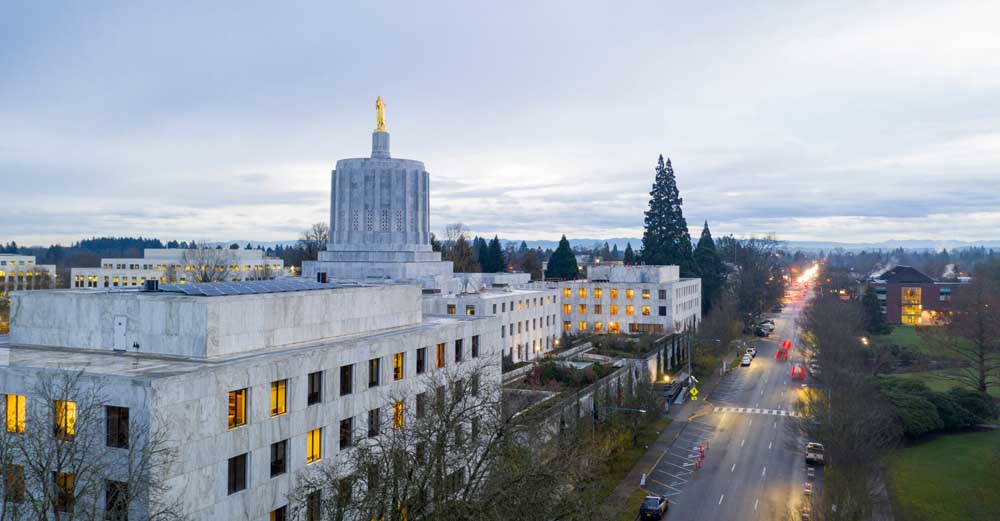Utahns, Oregonians exposed to nuclear radiation could be compensated under GOP megabill
Published 6:32 am Thursday, July 3, 2025

- The Oregon Capitol in Salem.
The federal government’s program that gives payments to people sickened by nuclear weapons testing could be reauthorized and expanded in federal budget bill
The federal government’s program that gives payments to people sickened by nuclear weapons testing is one step closer to being reauthorized and expanded.
On Tuesday, Senate Republicans passed their massive tax and spending package, nicknamed the “big, beautiful bill” — among its many provisions is an expansion of the Radiation Exposure Compensation Act, or RECA, which expired more than a year ago.
If the bill clears the final vote needed from the House, downwinders in all of Utah will now receive compensation for their medical bills, marking a significant change to the program that advocates say was too narrow to begin with.
Here are the RECA highlights, found in the final pages of the Senate’s 887-page bill:
- Downwinders in all of Utah, New Mexico and Idaho would now be eligible for payments. Coverage would also be widened in Arizona to include all of Coconino, Yavapai, Navajo, Apache, Gila, and Mohave counties. Residents who lived in certain parts of Missouri, Tennessee, Alaska and Kentucky who were sickened due to the Manhattan Project would also receive coverage.
The program’s new expiration date would be Dec. 31, 2028. - In some cases, people who lived in affected areas for just one year would be eligible for compensation — the program previously required they live there at least two years.
- The compensation amount — originally $50,000 to $75,000 — would be increased to $100,000 in most cases.
- Uranium miners and workers based in Colorado, New Mexico, Arizona, Wyoming, South Dakota, Washington, Utah, Idaho, North Dakota, Oregon and Texas would be covered. The timeframe of eligibility would also be extended to 1990.
Money for Oregonians exposed to radiation
Since the Radioactive Exposure Compensation Act was established in 1990, 430 people were living in Oregon at the time that they received federal compensation for radioactive exposure, totaling $27 million, according to the U.S. Department of Justice. Their current Oregon residence does not indicate where they were exposed. Many individuals were likely living downwind of nuclear weapons testing, or worked in the uranium mining industry in Oregon or other states in the mid to late 1900s.
Oregon experienced a uranium rush in the 1950s when the federal government offered $10,000 to anyone who discovered deposits of the radioactive ore, which at the time was used to make atomic weapons, according to the Oregon Historical Society. The Lakeview Mining Company invested in two open-pit mines in White King and Lucky Mass in Oregon’s south-central Fremont National Forest. A uranium mill was built in 1958 to process the ore, but operations closed in 1961. Mining there stopped entirely around 1965, according to the Oregon Department of Energy. In 1995, the U.S. Environmental Protection Agency declared the mines a Superfund site, or an area polluted with hazardous material.
“RECA is generational legislation for Missouri and will finally deliver justice for survivors in the St. Louis region,” said Missouri GOP Sen. Josh Hawley, who sponsored the provision. “I call on the House to quickly pass this legislation and send it to President Trump’s desk.”
RECA expired in June 2024 after Congress failed to reauthorize it, and in the year since, downwinders who were just recently diagnosed with cancer or who didn’t know about the program were left without compensation.
The program had been in place since 1990, but downwinders have long said it should be expanded. Despite studies suggesting the entire West was blanketed by dangerous levels of radiation during nuclear tests, downwinders in just 10 counties in Utah, as well as a handful of counties in Nevada and Arizona, were covered.
News that RECA was one step closer to revival was met with mixed reactions on Tuesday from Utah downwinder Mary Dickson. A longtime advocate for RECA expansion, Dickson said it was “bittersweet” — if the bill passes the House, she’ll finally be eligible for coverage, after being diagnosed with thyroid cancer in 1985.
But Dickson and other advocates hoped a RECA expansion would be broader, covering all of Nevada, Arizona, Montana, Guam and other places impacted by Cold War weapons testing.
“Obviously I’m happy to see more downwinders covered. I’m very happy to see that. But I’m also heartsick to see that so many others that we’ve been fighting with in this battle for so long are left out,” she said. “It feels a bit like a hollow victory to me.”
Last year, Hawley sponsored a bill that would expand the program to cover much of the West, and parts of the St. Louis area, where creek water was contaminated by radiation during nuclear weapons development. The bill passed the Senate but stalled in the House, mostly over spending concerns.
It’s not yet clear whether RECA has the support needed in the House to withstand the final vote. The New York Times estimates that the current proposed expansion will cost about $7.7 billion.
Utah News Dispatch is part of States Newsroom, a nonprofit news network supported by grants and a coalition of donors as a 501c(3) public charity. Utah News Dispatch maintains editorial independence. Contact Editor McKenzie Romero for questions: info@utahnewsdispatch.com.
Oregon Capital Chronicle reporter Mia Maldonado contributed reporting to this story.





